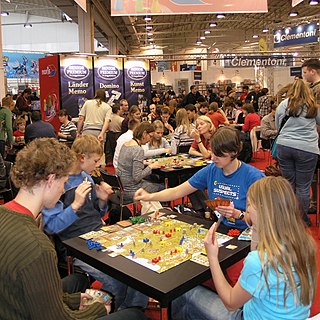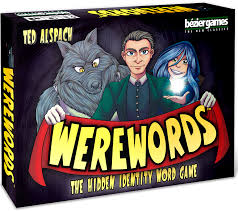
The Spiel des Jahres is an award for board and card games, created in 1978 with the purpose of rewarding family-friendly game design, and promoting excellent games in the German market. It is thought that the existence and popularity of the award was one of the major drivers of the quality of games coming out of Germany, particularly in the 1980s and 1990s. A Spiel des Jahres nomination can increase the typical sales of a game from 500–3,000 copies to around 10,000, and the winner can usually expect to sell as many as 500,000 copies.

Reiner Knizia is a prolific German-style board game designer. He was born in West Germany in 1957 and earned a doctorate in Mathematics from the University of Ulm before designing games full time. He is frequently included on lists of the greatest game designers of all time. Many of his hundreds of designs are considered modern classics, and many have won or been nominated for significant gaming awards, including the Spiel des Jahres and the Deutscher Spiele Preis. His notable designs include Amun-Re, Blue Moon City, Ingenious, Keltis, Lord of the Rings, Medici, Modern Art, Ra, Taj Mahal, Tigris and Euphrates, and Through the Desert. Many of his designs incorporate mathematical principles, such as his repeated use of auction mechanics.

Days of Wonder is a board game publisher founded in 2002 and owned by Asmodee Group since 2014. Days of Wonder distributes its games to 25 countries. It specializes in German-style board games and has branched out to include some online games. Days of Wonder has published games in several languages including English, Dutch, French, German, Russian, and Greek. Days of Wonder was co-founded by Eric Hautemont, Mark Kaufmann and Yann Corno.

Internationale Spieltage SPIEL, often called the Essen Game Fair after the city where it is held, is an annual four-day public boardgame trade fair held in October at the Messe Essen exhibition centre in Essen, Germany. It began in 1983. With 1,021 exhibitors from 50 nations in 2016, SPIEL is the biggest fair for board games in the world. Many new games are released at the fair each year, especially European-style board games.

Queen Games is a German publisher of tabletop games, based in Troisdorf and founded in 1992 by head Rajive Gupta, which specialises primarily in German-style, family-level games but has also published smaller numbers of both simpler, children's games and more complex, gamers' games.

Zooloretto is a board game designed by Michael Schacht, published in 2007 by Abacus Spiele and in English by Rio Grande Games. The premise of the game is that each player is the owner of a zoo, and must collect animals in order to attract visitors to their zoo. Having full, or nearly full, animal enclosures scores more points. However, if a player has too many animals such that they must be stored in their "barn", this causes them to lose points. Vending stalls also offer a means for players to score points with enclosures that are not full.

Walther M. Gerdts, known as Mac Gerdts, is the designer of German-style board games such as Imperial, Imperial 2030, Antike and Hamburgum. His games introduced the concept of a rondel rather than dice as a mechanism for play. This is designed to prevent players from repeatedly taking the same action in quick succession without paying a cost.

Agricola is a Euro-style board game created by Uwe Rosenberg. It is a worker placement game with a focus on resource management. In Agricola, players are farmers who sow, plow the fields, collect wood, build stables, buy animals, expand their farms and feed their families. After 14 rounds players calculate their score based on the size and prosperity of the household.

Bézier Games, Inc. is a privately owned American tabletop game publisher, known by hobby gamers for Castles of Mad King Ludwig and Suburbia, and known to casual gamers for the One Night Ultimate Werewolf series, Werewords, the Silver series, and Ultimate Werewolf. It was founded in San Jose, California in 2006 by Ted Alspach upon publication of Start Player. In 2013, the company was renamed Bézier Games, Inc. when it incorporated. The company moved to Louisville, Tennessee in 2016 run by Ted & Toni Alspach.
Vladimír Chvátil, often known professionally as Vlaada Chvátil, is a Czech board game and video game designer. He became a recognizable name in the board game community following the publication of Through the Ages: A Story of Civilization in 2006 and thereafter his designs frequently made the top 100 list on BoardGameGeek. In 2016, he won the coveted "Spiel des Jahres" award for Codenames. In 2019, he entered the Origins Award Hall of Fame.

Galaxy Trucker is a science fiction board game for two to four players. It was developed by Vlaada Chvátil, with graphics designed by Radim Pech. The Czech version of Galaxy Trucker was released in 2007 by Czech Games Edition, and a German version was published in the same year by Heidelberger Spieleverlag. In 2021, a revised edition of the game was released.

Istanbul is a Euro-style board game designed by Rüdiger Dorn and illustrated by Andreas Resch and Hans-Georg Schneider, published in 2014 by Pegasus Spiele.

Splendor is a multiplayer card-based board game, designed by Marc André and illustrated by Pascal Quidault. It was published in 2014 by Space Cowboys (Asmodee). Players are gem merchants of the Renaissance, developing gem mines, transportation, and shops to accumulate prestige points. Splendor received positive reviews and received numerous awards, including winner of Golden Geek Best Family Board Game. It was nominated for the Spiel des Jahres Game of the Year in 2014. The game also received a mobile application and an expansion released in 2017.

Jaipur is a two-player card game created by Sébastien Pauchon in 2009 and published by Asmodee. Players assume the roles of powerful merchants in Jaipur, the capital of Rajasthan. The aim is to receive two "seals of excellence" and be invited to the court of the Maharaja. The game focuses on buying, exchanging, and selling at better prices, all while keeping an eye on both your camel herds.

Colt Express is a railway-themed family board game designed by Christophe Raimbault, Illustrated by Ian Parovel and Jordi Valbuena, published in 2014 by Ludonaute and distributed by Asmodee.

Love Letter is a card game introduced in May 2012 and designed by Seiji Kanai. Its first English-language edition was produced in the United States by Alderac Entertainment Group (AEG) until 2018, when Love Letter was acquired by Z-Man Games.
Ian Parovel, is a French art director, film director, game designer, screenwriter, and designer living in Saint-Germain-en-Laye.

Werewords is a board game for 4 to 10 players designed by Ted Alspach and published by Bézier Games in 2017. Players guess a secret word by asking questions. There are different roles randomly assigned at the start of play. Villagers try to find out the magic word before the time is up while the werewolves are trying to mislead them.

Isle of Skye: From Chieftain to King is a tile-laying board game designed by Alexander Pfister and Andreas Pelikan that was published in 2015. It uses the Isle of Skye as its setting, with players representing clan chieftains each vying to build a kingdom.



















